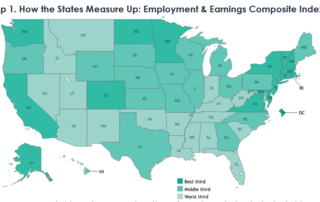Status of Women in the States
IWPR’s Status of Women in the States project provides data and analysis on the health, economic, social, political well-being of women. The project provides state-by-state rankings on issues such as pay equity and earnings; poverty and economic security; reproductive rights and access to health care and political participation and civic engagement.

The Economic Status of Women in Collin, Dallas, & Denton Counties, Texas
Women in Texas have made progress in recent years, but still face inequities that can prevent them from reaching their full potential. This fact sheet examines trends in Texas women’s status in the areas of employment and earnings, and poverty and opportunity.
The Economic Status of Women in the U.S. What Has Changed in the Last 20 – 40 Years
Heidi Hartmann, Ph.D. presents to the GAO.
The Economic Status of Women in the States
This Fact Sheet presents findings from analysis of the Employment & Earnings Index and Poverty & Opportunity Index of The Status of Women in the States series, a comprehensive project that presents and analyzes data for all 50 states and the District of Columbia.
The Status of Women in Lubbock County, Texas
This report provides critical data illuminating the status of women in Lubbock County, in terms of their civic engagement, health outcomes, vulnerability to poverty, and access to employment, education, and entrepreneurial opportunities.
The Status of Black Women in the United States
This report aims to amplify the historical and current contributions of Black domestic workers to the broader domestic worker movement. Using available data, the report describes the experiences of millions of Black women across the United States, and offers recommendations where the opportunities for Black women can be realized.
The Status of Women in Florida by County: Population & Diversity
This briefing paper highlights demographic information relevant to the status of women in Florida. It explores differences between women and men on a range of variables, including age, race and ethnicity, marital status, household type, immigration status, geography, and veteran status.







